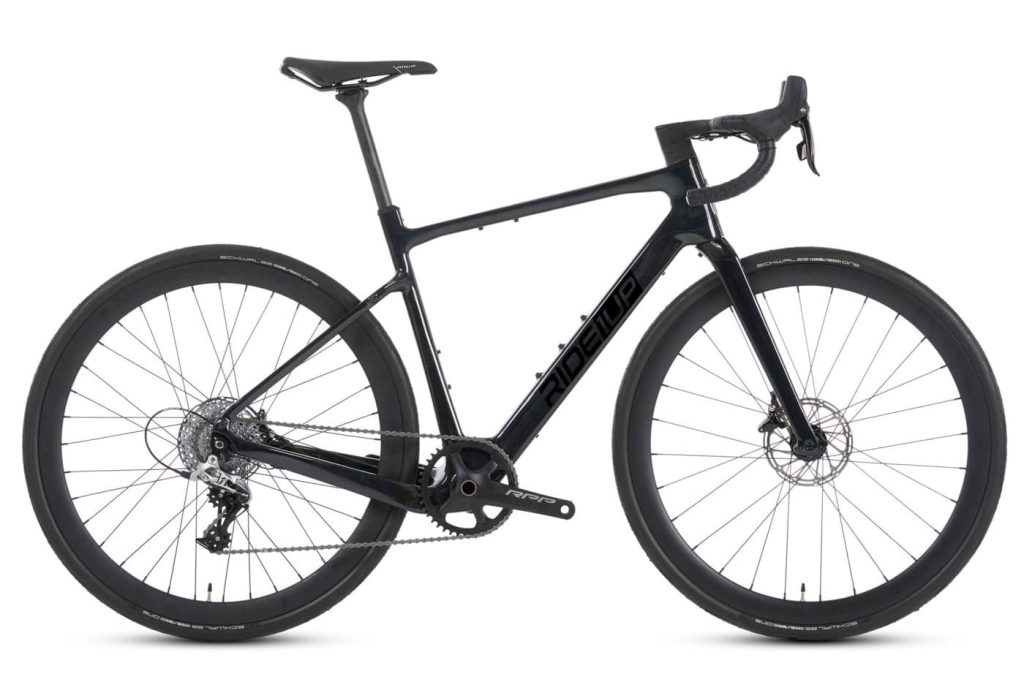If you’ve got a fat enough wallet, there are some seriously high-end electric bikes floating around out there from top-shelf e-bike companies. But what if your taste for finer things doesn’t quite match up with your real-world budget? Now Ride1Up is unveiling the answer in its new CF Racer1 carbon fiber electric road bike and gravel bike.
Available in two styles (road and gravel) as well as two sizes (50 and 56 cm), the CF Racer1 offers that sleek, lightweight fitness bike sought by many – yet without the high cost.
While most high-end electric road bikes can cost upwards of $4,000 (or significantly more if you opt for the super-premium component choices), the Ride1Up CF Racer1 is priced at just US $2,295 and even comes with a reduced $2,195 launch price.
So what do you get for that price? The bike is built around an ultra lightweight solid-form carbon fiber frame with concealed wiring and electronics. A carbon fiber fork, seat post, and stem/handlebar combo also help shave weight off the bike, dropping the road version to just 27.4 pounds (12.4 kg). The gravel version is roughly one pound heavier, largely thanks to chunkier tires. For ruggedness, the CF Racer1 meets ISO 4210 bicycle safety standards and is TUV strength-tested and certified.

The CF Racer1’s drop bars feature 11-speed SRAM Rival 1 Ergofit hydraulic brake levers with DoubleTap shifter for easy simultaneous braking and shifting.
The shifter is paired with an 11-speed SRAM Rival 1 derailleur designed to reduce chain slap, which rides next to an 11-42T cassette.
There are two options for tires, featuring either Schwalbe E-One 700x32c on the road bike or Continental Terra Trail 700x40c on the gravel bike.
The handlebars are also slightly wider with more flare on the gravel version.

On the e-bike component side, the motor is a 250W geared hub motor with 42 Nm of torque. That’s one of the key ways that Ride1Up was able to drop the price compared to other gravel and road e-bikes that cost twice as much. Without the typical mid-drive motor, the bike is more affordable to produce. It doesn’t entirely account for the price difference (the components are nice but not premium here), but it goes a long way when you don’t have to pay a German motor-maker top dollar to put their powertrain in your bike.
And while 250W doesn’t sound like a lot of power for a North American e-bike, the 36V 15A controller likely pulls close to 500W from the battery to send to the motor, meaning the continuous 250W rating of the motor only tells part of the story. The 28 mph (45 km/h) top speed also speaks to the higher peak power of the motor.
The 36V 7Ah battery offers 252 Wh of capacity, which is also on the smaller end of the spectrum for most North American e-bikes. While Ride1Up’s commuter e-bikes offer well over twice as much capacity, this smaller battery size is quite common on lightweight fitness and road e-bikes like these. As a pedal-assist e-bike, even a smaller 252 Wh battery can still provide an impressive range.
In this case, the company claims a range of up to 40 miles (64 km) in low-power pedal assist. However, pushing hard at 28 mph (45 km/h) can reduce the range down to as low as 16 miles (25 km), according to Ride1Up. If that’s not enough range for you, Ride1Up offers an additional range extender battery that can double your capacity and fits into the bike’s water bottle holder for easy installation.
The frame-enclosed battery is not intended to be regularly removable for off-bike charging, though can be removed with a few tools for replacement down the line. That’s a bummer for those that want to remove their battery for charging indoors, but then again the bike only weighs 27 pounds, making it easier to carry inside. And you probably shouldn’t leave a carbon fiber bike parked on the street very long anyway, as it’s got a bullseye on it for thieves.

Other components include a VeloFox center mount color display on the handlebars, front thru-axle hub, a Selle Royale Aslphalt GF saddle, and PU-leather bar wraps.
Oh, and it’s probably worth pointing out that Ride1Up still has a crazy-good holiday sale going on with up to $400 off many of the company’s popular models. If you want an even lower-cost e-road bike (that also has belt drive), check out the Ride1Up Roadster V2 which is on sale for an incredible $795.
Electrek’s Take
This looks like a very interesting addition to the market for anyone who has wanted to get a super lightweight fitness e-bike experience but can’t afford a $4k-$5k electric bike. Of course, this isn’t going to be the same experience – the hub motor with a cadence sensor can’t compare to the intuitive experience of a mid-drive motor with a torque sensor. Even so, the ride is going to feel quite similar for many folks in most situations once you’ve hit cruising speed (i.e. not at the bottom of a big hill when you forgot to downshift first).
If Ride1Up had managed to sneak a torque sensor into this bike then that would have been the cherry on top. Without it, there’s still a lot to like here. Sure, the folks who ride a Specialized Turbo Creo 2 every day are going to pick this bike apart for its shortcomings. But this isn’t an e-bike for those folks. It’s an e-bike for folks like me, who wish I could ride a Crea 2 but can’t justify a $6,500 e-bike that admittedly has a nicer motor and components (yet actually weighs 4 pounds more than the Ride1Up CF Racer1).
At US $2,195, this is a heck of a price for a carbon fiber e-road or e-gravel bike with some pretty darn good performance.
Read the full article here


